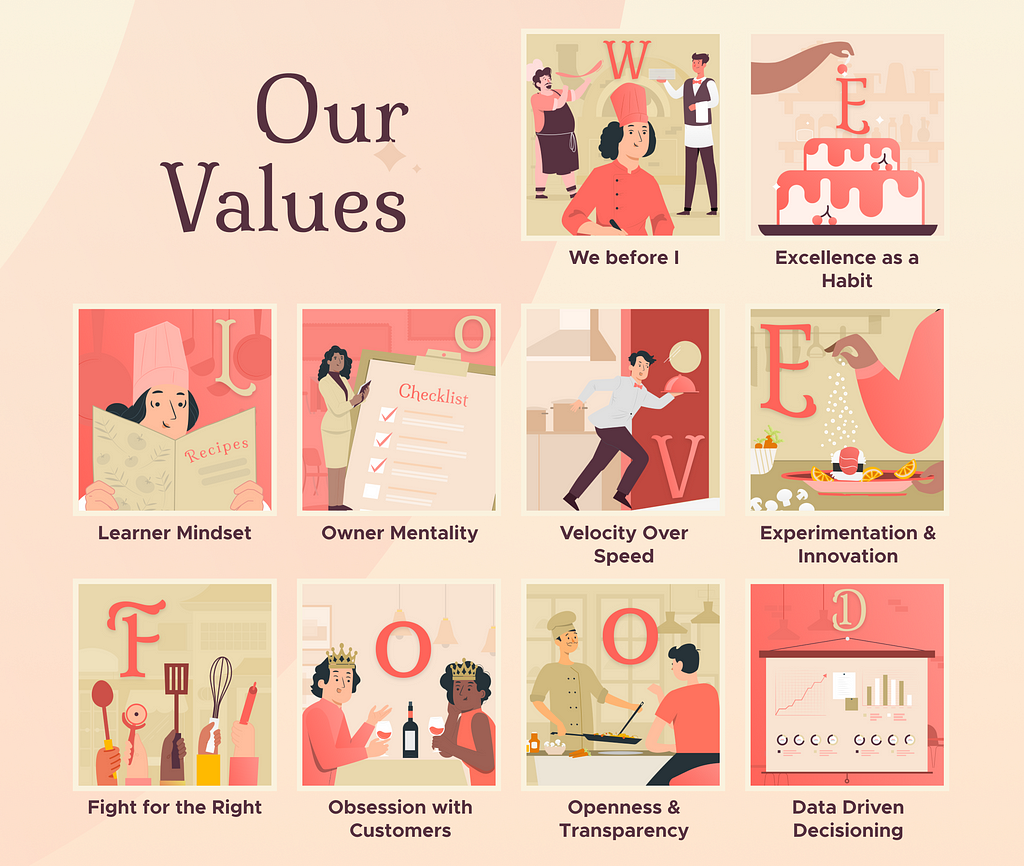Decoding the Dineout Culture Recipe: 10 values that drive us
At Dineout, we are committed to building a company that not just excels at solving the problems of the customers, but one that our employees are proud of being associated with.
Some time last year, we identified the need of a cultural shift at Dineout: We identified a set of core values that we want to focus on as a company. Over the period of last one year, we made it a very explicit focus for us to see every product, every project and every feature request through the lens of these values. We would challenge each other and even encourage our stakeholders to call us out when we display behaviour that is incongruent with these values. Today, we are publishing these values externally as we want ourselves to be held even more accountable to our culture.
In full transparency, I want to emphasise that these values do NOT exactly describe where we are. Consider these values as part definitional and part aspirational, i.e. this partly defines what we already are and partly what we are working towards being. However, you will see that all values are written in the present tense: “We are this”, “We do that”, etc. This is on purpose: As James Clear says in Atomic Habits, the key to making lasting changes is to focus on identity-based habits and make the desired behaviour change a part of your identity.
So, here are the ten values that define us in no particular order (Well, there is an order, but not in terms of importance. More about that later in this blog.):
1. We Before I
Coming together is a beginning. Keeping together is progress. Working together is success.- Henry Ford
At Dineout, we put Team before Self. And when we say “team”, we do not just mean the immediate team an individual is on; we are talking about Team Dineout. We are solving some interesting big challenging problems in the field of food-tech and restaurant tech and solving these can not be a one-person-job. We not only respect each others’ opinions; we actively seek them. As a team, we come from diverse professional, academic and cultural backgrounds and the combined experience and expertise of the team delivers much better results than what any individual can.
A corollary to this is our absolute unwillingness to tolerate brilliant jerks. Any individual who does not espouse “We before I” will be a misfit at Dineout irrespective of how big a rockstar he/she is in individual capacity.
2. Excellence as a habit
We are what we repeatedly do. Excellence, therefore, is not an act, but a habit.
- William Durant
Whether it is hiring the right people or the shipping products for our customers, we chase excellence in everything we do. That means that everyone brings their A-game to work every day and holds themselves and others to the highest standards. We ship things that make us proud and we celebrate those wins, but we are never done, because we know we can do even better!
This quest for excellence is different from an unreasonable chase of perfection. That would slow us down and as a growth-stage startup, we can’t afford to do that (See value #5 below). In pursuit of excellence, we strive to do things in the best way possible, learn from mistakes and correct them the next time even if we never get anywhere close to perfection.
3. Learner mindset:
Learn continually — there is always ‘one more thing’ to learn! - Steve Jobs
Yes, we take pride in hiring the best, but at the same time, we know we live in a VUCA world: a world with Volatility, Uncertainty, Complexity and Ambiguity. In this world, both as individuals and as an organisation, we need to keep learning and upgrading our skills not just to grow, but to survive! That’s why at Dineout, we believe in cultivating a perpetual student mindset: we encourage everyone to always actively and continually pursue learning opportunities.
Even with a learner mindset and availability of a plethora of trainings from both internal and external sources, sometimes things do get busy as you would expect to be the case with a fast-paced startup. One way this worked well for some members of the product team last year is to actually take a formal learning goal while writing their OKRs. This made them as much accountable for the learning goals as they were for the goals around deliverables. We are using this approach a lot more in the current performance cycle.
4. Owner Mentality: Own outcome, not outputs:
Our success will be largely affected by our ability to attract and retain a motivated employee base, each of whom must think like an owner. - Jeff Bezos
The old African proverb “It takes a village to raise a child” can be extended to the corporate world too: It does take the whole organisation to build and grow a company. That’s why, we encourage everyone at Dineout to cultivate an owner mindset instead of a mere executor mindset.
What does having an owner mindset look like in practice? We don’t say “It’s not my job” (even if it isn’t) when we see a problem. We either own the problem or find the right person to solve it. We do not limit ourselves to what we are asked to do. We consistently do what is right for the company. Above all, as owners, we hold ourselves accountable for outcomes, not just outputs.
5. Velocity Over Speed
Speed is irrelevant if you are going in the wrong direction. - Mahatma Gandhi
A quick refresher of Grade 6 Physics: Speed is the rate at which an object is moving, while Velocity captures both the rate and the direction of movement.
We are a growth stage startup and for us, speed matters a lot. A good solution delivered next week is better than a perfect one three months later. Very often, we may not have all the information required to make a decision, and in cases like this, we ship, we iterate, we learn and then we ship again!
However, here comes the velocity part: going fast in the wrong direction will only take you further from your destination faster. We have some North Star goals and metrics to guide us and we want to move fast in that direction. We welcome and actively encourage pilots, MVPs and even hacks to ship faster as long as they take us a step or two closer to these goals.
Are detours to try out newer ways to get to the destination okay? Read on about that in the next value.
6. Experiment and Innovate
What good is an idea if it remains an idea? Try. Experiment. Iterate. Fail. Try again. Change the world. - Simon Sinek
We are solving some interesting problems for a 2–3 centuries old industry. Some problems have been there for decades and some problems have been introduced with the advent of the digital era. Solving these problems is not easy and any solution, however well researched, is not guaranteed to succeed.
Solving these problems involves coming up with innovative ideas and experimenting with the ones which we really believe in. Some of these experiments may succeed, but a bigger number will likely fail. Instead of fearing these failures, we embrace big bet thinking. We encourage our team members to take a shot at these problems in unique and interesting ways with a belief that even a handful of successes in these bets can have a transformative effect on the industry.
A simplified view of the life cycle of big bets looks something like this: Identify problem, Ideate, Solutionize, Experiment, Fail, Course-correct, Succeed, Repeat! The steps of Failure and Course-correction are, of course, optional. But more often than not, these steps are repeated a few times in the cycle instead of being omitted.
7. Fight for the right:
Our lives begin to end the day we become silent about things that matter.
- Martin Luther King, Jr.
We believe in taking a stand for what we believe is the right thing to do. This means speaking up even when it is a bit uncomfortable and even when (and especially when) we may be the only one in the room with a counter-opinion. We use data, logic, customer feedback, competitive benchmarking and even anecdotes to present our point of view firmly, but respectfully and professionally (Remember We-Before-I!).
Keep in mind that we do not let “Fight for the right” get in the way of “Velocity over speed”. We debate logically and fervently, but not endlessly. We are biased towards making decisions and acting fast. Once a decision is made, we commit fully to it as a team.
8. Obsession about the customers
There is only one boss. The customer. And he can fire everybody in the company simply by spending his money somewhere else. - Sam Walton
We obsess about our customers and solving problems for them. We do not make assumptions about what problems may be bothering them or what may be good for them. We talk to them. We look at their usage patterns. We shadow them in their routine tasks. We conduct usability studies. Above all, we consider each of us as the representatives of the customers inside the company and take a stand for them in our internal discussions.
Contrary to what some may think, we do not need to choose between doing the right thing for the customers and doing the right thing for the business. In the long term, doing the right thing for the customers is the right thing for the business. Always!
9. Openness & Transparency:
The single most important ingredient in the recipe for success is transparency because transparency builds trust. - Denise M. Morrison
Openness & Transparency to us means being authentic: Sharing things the way they are without obfuscation. When it comes to sharing our values, our decisions and sometimes the reasoning behind those decisions, we err on the side of over-communicating. We practice this value through regular 1:1s, staff-meetings, and frequent org-wide communications. This value is paramount for us because transparency breeds trust and a team with people that trust each other and its leadership can move mountains together.
To some extent, this value can be considered a complimentary value to Fight-for-the-right. Both values do apply to everyone in the company. However, Fight-for-the-right is a more bottom-up value: it empowers everyone in the company to have a voice and stand behind it. In contrast, Openness & Transparency holds the leaders more accountable to be transparent and share their reasoning for their decisions.
We extend this value to not only our current employees, but also prospective ones. In our exploratory interviews, we openly share what we are, what we want to be and what we are not. While this brutally honest disclosure often surprises candidates, this is not really a difficult decision to make: We need people who sign up for our mission fully knowing what works fantastically well at Dineout and what is an area of improvement for us.
10. Data Driven Decisioning:
In God we trust. All others must bring data.- W. Edwards Deming
At Dineout, “data-driven” is not just a buzzword. This is how we make decisions and conduct business. The value may be listed last, but this is definitely not the least important one. In fact, to some extent, this value may be considered the engine that powers many other values. For example: it may be difficult to be customer obsessed if we do not study the data of how their current behaviour is on our platform. Experimentation won’t really lead to successful innovations in absence of data to prove or disprove the hypothesis being tested in the experiment. And of course, how would we fight for the right if there is no data to back up our beliefs.
Does intuition have no place in this data-driven world? What to do when there is no data for the decision we are trying to make?
Intuition often comes from years of experience in a domain or an industry and it won’t be wise to completely ignore it . Very often, intuition is the starting point to form a hypothesis in the decision making process and then we use data to prove or disprove it. And it is possible to be data-driven in approach even when full data is not available, which is usually the case. In these cases, we take assumptions, make guesstimates and visit these later to refine them for the future.
While the above ten values describe the “How” behind Dineout, there is one more thing that I have not touched upon yet: The “Why” behind Dineout. Scroll up to see if you can find this as a pattern that cuts across the ten values or may be see if you can spot it in the image below that captures the ten values together:
Most probably you see it now. Our ten values together spell out: WE LOVE FOOD!
That’s right! We love food, and that is, as the French would say, is our raison d’etre: our reason to be! We love food, We love those who love food, and We love those who serve food! This is why we exist and this is what keeps us going!
If you are as passionate about food as we are and the above 10 values resonate with you, we would love to talk to you. Visit the jobs section of our LinkedIn page for our currently open positions. Even if you do not find a relevant position but are still passionate about our mission, please shoot an email to careers@dineout.co.in.
Thanks to Kritika and Shrikant for the beautiful illustrations capturing our values.
Decoding the Dineout Culture Recipe: 10 values that drive us was originally published in Dineout Tech on Medium, where people are continuing the conversation by highlighting and responding to this story.













